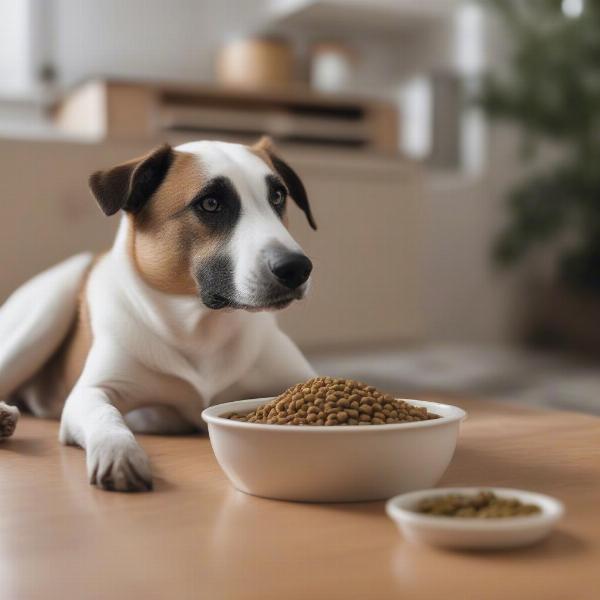Firm stool is a good indicator of a dog’s overall health and well-being. While occasional loose stools can happen, consistently soft or watery feces can signal an underlying issue. This guide will help you understand what constitutes firm stool in dogs, why it’s important, and what you can do to ensure your canine companion has healthy digestion.
What Does Firm Stool Look Like?
Ideally, a dog’s stool should be firm enough to hold its shape when picked up but not so hard that it’s dry and crumbly. It should be a chocolate brown color and relatively easy to pick up, leaving minimal residue on the ground. If the stool is too soft, watery, or contains mucus, it could indicate a digestive problem.
Why is Firm Stool Important for Dogs?
Firm stool indicates that your dog’s digestive system is functioning properly. It means that their body is effectively absorbing nutrients and eliminating waste. Consistent soft stool, on the other hand, can lead to dehydration, discomfort, and even nutritional deficiencies.
Causes of Soft Stool in Dogs
Several factors can contribute to soft stool in dogs, ranging from dietary indiscretions to more serious medical conditions. Some common causes include:
- Dietary Changes: Sudden changes in food can upset a dog’s digestive system.
- Food Intolerance or Allergies: Certain ingredients can trigger allergic reactions or sensitivities, leading to loose stools.
- Parasites: Intestinal parasites like worms can disrupt digestion.
- Infections: Bacterial or viral infections can cause inflammation in the gut.
- Stress: Changes in routine or environment can cause stress, which can manifest as digestive upset.
- Pancreatitis: This inflammation of the pancreas can affect digestion and cause loose stools.
- Inflammatory Bowel Disease (IBD): A chronic condition that causes inflammation in the digestive tract.
Achieving Firm Stool Through Diet
 Dog Eating Healthy Food
Dog Eating Healthy Food
Diet plays a crucial role in maintaining firm stool. Here are some dietary tips to promote healthy digestion:
- High-Quality Dog Food: Choose a high-quality dog food that’s appropriate for your dog’s age, breed, and activity level.
- Gradual Food Transitions: Introduce new foods gradually to avoid upsetting your dog’s stomach.
- Fiber: Adding fiber to your dog’s diet can help regulate bowel movements. profibre for dogs can be beneficial.
- Probiotics: Probiotics can support gut health and improve digestion. inulin for dogs is a good source of prebiotics that helps beneficial bacteria thrive.
- Hydration: Ensure your dog has access to fresh water at all times.
When to See a Vet
While occasional loose stools are usually not a cause for concern, persistent soft stool warrants a visit to the vet. If your dog’s stool is consistently soft or watery, contains blood or mucus, or is accompanied by other symptoms like vomiting, lethargy, or loss of appetite, seek veterinary attention immediately.
“A sudden change in stool consistency is always something to keep an eye on,” says Dr. Emily Carter, DVM. “It’s often a sign that something isn’t quite right in the digestive tract, and addressing it promptly can prevent more serious problems down the line.”
Home Remedies for Occasional Soft Stool
For occasional bouts of soft stool, you can try some home remedies after consulting with your veterinarian:
- Bland Diet: Feed a bland diet of boiled chicken and rice for a few days.
- Pumpkin: Plain canned pumpkin (not pie filling) can help firm up stool.
- Kaolin: kaolin for dogs can help absorb excess water in the intestines.
“Simple home remedies like a bland diet can often help resolve mild digestive upset,” adds Dr. David Miller, DVM. “However, it’s crucial to ensure the underlying cause isn’t more serious, so consulting with your veterinarian is always recommended.”
Conclusion
Firm stool is a crucial indicator of good digestive health in dogs. By paying attention to your dog’s stool and addressing any changes promptly, you can help ensure their overall well-being. Remember to feed a balanced diet, provide plenty of fresh water, and consult with your veterinarian if you have any concerns about your dog’s digestive health. A healthy gut contributes to a happy and thriving canine companion.
FAQ
- How often should my dog poop? Most dogs poop once or twice a day, but this can vary depending on diet, age, and activity level.
- What does black stool in dogs mean? Black, tarry stool can indicate bleeding in the upper digestive tract and requires immediate veterinary attention.
- Can stress cause soft stool in dogs? Yes, stress can disrupt the normal balance of gut bacteria and lead to loose stools.
- What should I do if my dog has diarrhea? If your dog has diarrhea, consult with your veterinarian to determine the underlying cause and appropriate treatment.
- Is it normal for a puppy to have soft stool? Puppies can have softer stool than adult dogs, especially when adjusting to a new diet. However, persistent diarrhea should be addressed by a vet.
- Can changing dog food brands cause soft stool? Yes, sudden changes in diet can upset a dog’s digestive system. Introduce new foods gradually.
- What are some good sources of fiber for dogs? Best dry food for dogs Australia often includes fiber. Other sources include pumpkin, sweet potatoes, and apples (without the core and seeds).
ILM Dog is a leading online resource for dog owners worldwide, providing expert advice on all aspects of dog care, from breed selection and health to training, nutrition, and grooming. Whether you’re a new dog owner or a seasoned expert, we offer valuable insights and practical tips to help you provide the best possible care for your canine companion. We also offer guidance on products and accessories to enhance your dog’s life. From puppy care to senior dog care, we cover all life stages. Learn more about our services at ILM Dog. Contact us at [email protected] or +44 20-3965-8624 for personalized guidance.